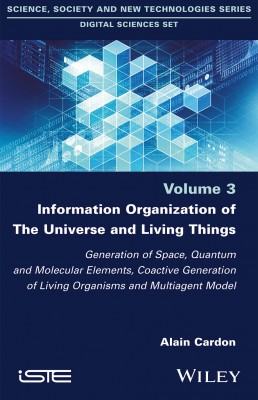
The universe is considered an expansive informational field subjected to a general organizational law. The organization of the deployment results in the emergence of an autonomous organization of spatial and material elements endowed with permanence, which are generated on an informational substratum where an organizational law is exercised at all scales.
The initial action of a generating informational element produces a quantity of basic informational elements that multiply to form other informational elements that will either be neutral, constituting the basic spatial elements, or active, forming quantum elements. The neutral basic elements will form the space by a continuous aggregation and will represent the substrate of the informational links, allowing the active informational elements to communicate, in order to aggregate and organize themselves. Every active element is immersed in an informational envelope, allowing it to continue its organization through constructive communications. The organizational law engages the active quantum elements to aggregate and produce new and more complex quantum elements, then molecular elements, massive elements, suns and planets.
Gravity will then be the force of attraction exerted by the informational envelopes of the aggregates depending on their mass, to develop them by acquisition of new aggregates. The organizational communication of the informational envelopes of all of the physical material elements on Earth will enable the organization of living things, with reproduction managed by communications between the informational envelopes of the elements, realizing a continuous and powerful evolution.
Part 1. Informational Generation of the Universe
1. The Computable Model, Computer Science and Physical Concepts.
2. The Informational Components and the Organizational Law of the Formation of Space and the Elements of the Universe.
3. An Agent Model to Represent Informational Components.
4. The Generation of the First Molecules in the Agent Approach.
5. The Formation of Physical Elements in the Agent Approach.
Part 2. Life Produced by the Organizational Law
6. The Characteristics of Scientific Theories of Life.
7. The Informational Interpretation of the Living.
Alain Cardon is Professor in Computer Science, specializing in artificial intelligence and artificial consciousness. He has retired from the LIP6 at Pierre and Marie Curie University, France, and is currently developing his research at the INSA of Rouen, in the LITIS laboratory.